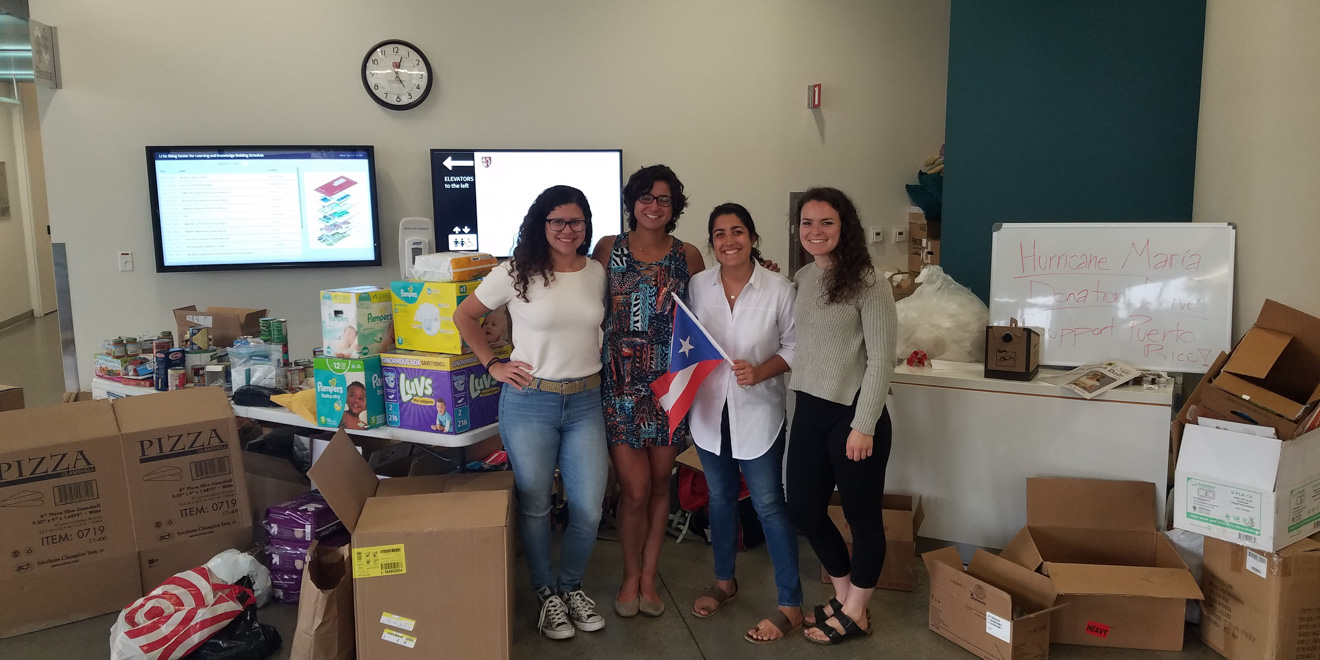Puerto Rican students rallied around a donation drive at the Stanford School of Medicine last week, seeking greater campus attention to not only devastation from Hurricane María but to the Puerto Rican community in general.
Keyla Badillo, a fourth-year graduate student in genetics, worked with second-year medical student Veronica Toro to organize the drive after they noticed relatively little action from other campus organizations. Badillo and Toro, who both hail from San Juan, Puerto Rico, said the drive yielded more donations than either of them expected.
“The impact to us is immense because we feel like people are really wanting to give and to donate,” Badillo said. “They’re full of empathy.”
Still, both organizers expressed disappointment in the University administration’s response to Hurricane María, which as of last week had left 85 percent of Puerto Rico without electricity, killed at least 48 residents and left more than 1 million more in search of clean water.
“Puerto Rico is in this colonial status, and it kind of bleeds through the situation at Stanford,” Badillo said. “If something happens in an international country, the international students get an email from [the] Bechtel [International Center], and if something happens in the U.S., usually they’ll send a full email to the whole University, like what happened with the shooting in Vegas.”
According to Chris Griffith, associate vice provost for student affairs, students who listed a Puerto Rico address received two emails. The first came as part of a broader response to potential victims of Hurricane Irma, which struck Puerto Rico in early September. The second, directed specifically at Puerto Rican students, came after Hurricane María hit the island Sept. 20.
Griffith did not specifically address the students’ criticisms in an email to The Daily. As for the University’s emails to Puerto Rican students, she explained that “due to personal absences, the second outreach was not as swift as we would have liked.”
While they appreciated the University’s apparent concern in the emails, Badillo and Toro said many of the Puerto Ricans on campus study as graduate students, so they do not list a home address and did not receive the emails.
“It really says something about some sort of disconnect,” Badillo said. “A good thing from this is that at least we are going to be able to establish that connection and have [the University] pay attention to us.”
While Badillo and Toro acknowledged the Stanford community’s response as exceptionally caring, they still felt there was a disparity between most of the country’s attitudes towards Puerto Ricans and attitudes towards citizens of the continental United States. Badillo explained that she saw Puerto Ricans express great concern for the ongoing wildfires in California, yet Americans seemed far more concerned with hurricane impacts in Florida and Texas than in Puerto Rico.
“In that sense it’s really sad,” Badillo said. “It’s just a matter of having empathy. If something’s happening immediately next to you it doesn’t mean you can’t worry about what’s happening still in your country, where there has been a humanitarian crisis for three weeks now.”
Stanford’s student government has also taken steps to assist with hurricane relief efforts on campus. ASSU vice president Vicki Niu ’18 said the senate formed two disaster relief teams on Oct. 3. One team will manage communications while the other searches for a 501(c)(3) organization to which students can donate.
Badillo serves as the Stanford liaison for the San-Francisco-based nonprofit SF4PR San Francisco for Puerto Rico (SF4PR), which recently reached out to the Ricky Martin Foundation to help handle shipping of donated items to the island. Thanks to a combination of SF4PR’s efforts and those of acquaintances in Florida, Badillo said, drive donations will reach the island.
“[The Federal Emergency Management Agency (FEMA)] wants to control a lot of things, and the Puerto Rican government wants to control a lot of things, so it’s been complicated to know the best way of getting things over there,” Badillo explained. “It’s becoming more clear now, and it’s just a matter of working with the people who have more means.”
Despite their minor frustrations, Badillo and Toro are both hopeful that disaster relief efforts will bring positive change to Puerto Rican students at Stanford. To them, Wednesday’s drive only marked the beginning.
“It served to unify a lot of the Puerto Ricans on campus,” Toro said. “We’ve met people we didn’t know who were here before. It shows the kind of people that Puerto Ricans are. We’re very patriotic, and we really care about the island.”
While graduate students Badillo and Toro led initial efforts, Julianne Dones ’18 said she hopes to continue to help the rebuilding process in Puerto Rico throughout the academic year. Dones grew up in the continental U.S., but her extended family still lives on the island.
“This is going to be something in that Puerto Rico is going to have to be rebuilding for a long time,” Dones said. “Not just in a year. Not just in two, five, 10 years. More than that.”
Dones added that she hopes Hurricane María will draw more attention to the island than the recurring argument of statehood brings every few years.
“This is a more tangible, in-your-face wake-up call for a lot of Americans,” Dones said. “I’m hopeful. I think I should be hopeful.”
Badillo requested that those wishing to contribute to Puerto Rican relief efforts on campus contact her at [email protected].
Contact Holden Foreman at hs4man21 ‘at’ stanford.edu.
